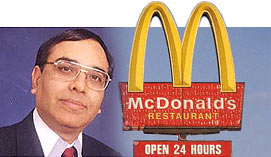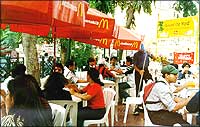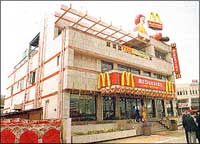The Rediff US Special/Nirshan Perera


Exactly one month ago, a relatively unknown attorney named Harish Bharti filed a lawsuit against a fast-food giant, which is, of course, a household name.
That little piece of litigation, it turned out, was a shot heard round the world, seeding a hurricane of bad press for McDonald's and launching Seattle-based Bharti into the limelight.
Within days, the NRI press -- buzzing for weeks on the revelation that McDonald's laced its french fries with beef tallow (and, perhaps, wasn't forthcoming enough with vegetarian customers) -- latched on to the story: On behalf of nearly a million US Hindus and 15 million non-Hindu vegetarians, an ambitious Indian attorney was wielding the cudgel of a class action complaint to bring the multinational to its knees.
Bharti's lawsuit soon fanned on to the front pages of mainstream media. He was interviewed by CNN. Reuters and the Associated Press picked up the story. By mid-May, the University of Jaipur graduate, who worked as a bar-approved legal intern in the US until he passed his bar exam, made the front page of The New York Times.
Last week, the avalanche of unexpected attention finally forced Ronald McDonald's hand. The mammoth chain, which sells about 1.05 billion pounds of beef-flavoured fries in the US each year, issued a conditional apology to vegetarian customers -- in case the information on fries was not "complete enough to meet their needs" -- without admitting any wrongdoing.
But Bharti hasn't quit.
He now wants an unconditional apology from McDonald's. And a couple of hundred million dollars in punitive damages wouldn't hurt either.
 His first lawsuit, in fact, has spiralled into three -- the original in the state of Washington, one in California and the last, up north in Canada. Each case has three primary plaintiffs and has not yet been accorded class action status by the presiding judges.
His first lawsuit, in fact, has spiralled into three -- the original in the state of Washington, one in California and the last, up north in Canada. Each case has three primary plaintiffs and has not yet been accorded class action status by the presiding judges.
This week, rediff.com delved into the maze of class action law to try and figure out what the future may hold.
Of most interest: If Bharti wins his case, will every Hindu in America, and every veggie to boot, get a slice of the potentially huge punitive damages pie?
Maybe. Maybe not.
Speaking generally on the subject of class action lawsuits, Anu Gupta, a San Francisco attorney with broad experience in corporate law, observes that most complaints are actually settled out of court within the first year of filing.
Class action suits can drag on for years and it is often in the interests of both parties to resolve their differences at an early stage.
Large corporations are rarely willing to risk the prolonged press attention and plaintiffs' attorneys, who must pay out of pocket for years of litigation anticipating a good chunk of the settlement, often want maximum return on minimum investment.
Although the legal rules can differ from state to state, the judge presiding over the matter typically must give permission for the suit to end amicably and has the final say, Gupta notes. Still, about 70 to 80 per cent of class action cases are resolved in this fashion, she says.
"I am not familiar with all the particulars of this case," she adds. "But I'd think it would be in McDonald's interest to end this matter quickly."
Not surprisingly, McDonald's is mum on the subject of settling the case. But Bharti won't show his cards either.
For good reason: If an agreement is reached before the case is legally certified as a class action -- a lengthy and arduous process in which the judge essentially agrees that many people could be affected -- then the 1 million Hindus and 15 million vegetarians who Bharti says he's suing for would be essentially cut off from any monetary settlement. Only the attorney and his primary plaintiffs would benefit from the settlement, which is almost always an undisclosed sum.
But that's only one scenario. The field of class action litigation is highly complex and there are many factors that could affect the outcome.
 If McDonald's, with its deep corporate pockets and a virtual army of specialist attorneys at hand, decides to take Bharti on for the long haul, it's anyone's guess what could happen.
If McDonald's, with its deep corporate pockets and a virtual army of specialist attorneys at hand, decides to take Bharti on for the long haul, it's anyone's guess what could happen.
Since California has very strict consumer protection laws and a liberal history of awarding punitive damages, it will most likely be the bellwether case, sidelining the Washington and Canadian complaints, Bharti says.
The presiding judge in California could decide the case has no class action merit, in which case Bharti can fall back on his lawsuits in Washington and Canada.
If, on the other hand, the ruling goes his way and the suit is certified as a class action then the attorneys and the judge must agree on the exact definition of potential class members. In other words, another round of legal arbitrage begins over who is and who isn't party to the lawsuit.
Can every fastidious Hindu and vegetarian in America be Bharti's client? Again, it's all up in the air.
"It could be a narrow class or it could be a wide class," Bharti admits.
Once this definition is reached, a long process of informing class members begins. In this case, ads would most likely be taken out in the Indian and vegetarian media and some mainstream outlets to spread the word. Class members would be responsible for contacting Bharti to become part of the lawsuit.
If a settlement is reached at this point, the primary plaintiffs and all the class members will be entitled to share any monetary award. Likewise if the case goes to trial and Bharti wins.
But, even if McDonald's defence -- that they didn't fraudulently promote their fries as vegetarian food -- crumples, the exact form of the payout could be mediated by the judge.
In a massive class action, with as many as 16 million class members, a fund could set up, for instance, to educate people about Hindu philosophy or vegetarianism. In the successful class action campaign against the tobacco industry, this is what happened: avoiding the hairy logistics of paying individual smokers, much of the settlement money has been used to fund public education anti-smoking campaigns.
The only thing that's clear at this point in the McDonald's row is this: The wheels of justice grind slowly and anything could happen. In the meantime, if you're a Hindu or lettuce lover, don't count on a cheque anytime soon and stay away from those beef-flavoured fries.
EARLIER REPORTS:
Harish Bharti fears dirty tricks
'McDonald's apology is not enough'
'Fight Uncle McDonald, and KFC, and...'
No beef in McDonald's french fries: BMC
'I've been violated for over a decade'
Eric Schlosser wrote Bharti's script
'Even the pea soup has ham!'
BJP activists throw cowdung at McDonald's outlet in Bombay
Bharti's beef with McDonald's
Back to top
Tell us what you think of this feature